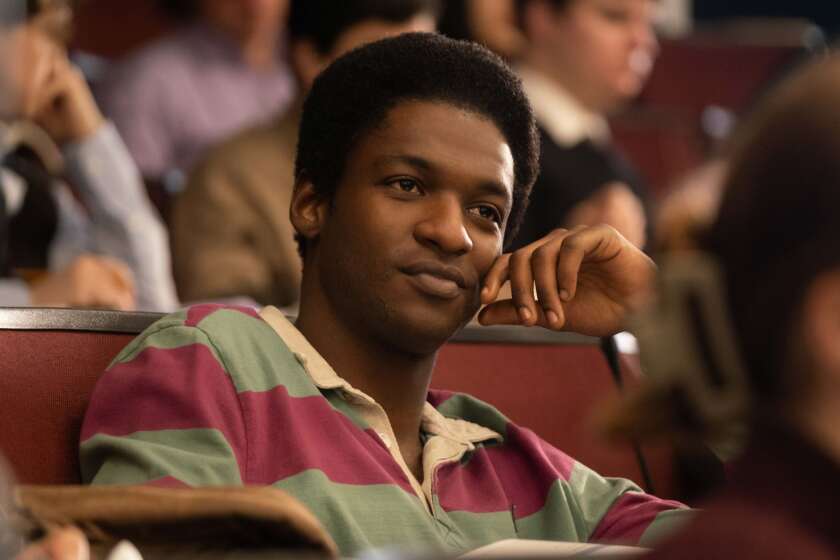Warren Beatty talks Madonna, ‘Ishtar,’ his conquests, his new movie and just about everything else

Warren Beatty is charming, this much goes without saying. What is perhaps less well known, less understood, is the variety of purposes to which Beatty can deploy that renowned, near-weaponized charm as part sword, part smokescreen, part invitation, part deflection.
The new “Rules Don’t Apply,” finds Beatty returning to the screen as director, screenwriter, producer and actor in a story framed around eccentric industrialist Howard Hughes. It is the first film directed by Beatty since 1998’s political satire “Bulworth” and his first time onscreen since 2001’s ill-fated comedy “Town & Country.” The new film has its upcoming world premiere as the opening-night selection of the AFI Fest film festival, premiering at the Chinese Theatre in Hollywood, as did Hughes’ 1930 film “Hell’s Angels,” before opening later in the month.
Beatty’s phenomenal string of successes, as an actor in “Splendor In the Grass,” then a producer with “Bonnie & Clyde,” a writer with “Shampoo” and director with “Heaven Can Wait,” have given him the confidence, patience and ability not to rush. He is the only person to two times be nominated for Oscars for directing, writing, producing and starring in the same film. He won the directing Oscar for “Reds” in 1982 and was in 2000 was awarded the academy’s Irving G. Thalberg award.
“I was lucky. I didn’t have to make movie after movie after movie. I could take my time. I also had a life. I got caught up in the urgencies of life,” he said. “You might say that I luxuriated in that thing that fame affords, which is access.”
In the film, which unabashedly condenses and embroiders events from Hughes’ life, an aspiring actress from Virginia, Marla Mabrey (Lily Collins), arrives in Los Angeles under contract to Hughes (Beatty), who provides housing, schooling and a never-quite-fulfilled promise of movie stardom. Frank Forbes (Alden Ehrenreich) is a Hughes-employed young man with ambitions beyond chauffeuring around would-be starlets. The obvious attraction between Marla and Frank is hindered by Hughes’ rule that the drivers not date the actresses, as well as Hughes’ intrusions into both their lives.
Beatty sat for a recent interview at the stately house off Mulholland Drive he shares with his wife, actress Annette Bening. The two married in 1992, having met making the movie “Bugsy,” and they have four children together. (Bening also has a small role in “Rules” as Marla’s mother.) Their house features a panorama of the Valley on one side and an ocean vista from the other. This is the view from the top of Hollywood.
You might say that I luxuriated in that thing that fame affords, which is access.
— Warren Beatty
In conversation, Beatty creates an almost conspiratorial sense of inclusive warmth, even as his responses can have an evasive circularity, with parentheticals inside parentheticals and more than a few disorientingly long pauses midthought. Sometimes he will allow his words to just trail off and then simply nod, signaling that he is no longer pausing, he is done.
He gives the impression that nothing is off limits, but Beatty will deploy that celebrated charm like a surgical tool to carve out exactly what he wants to say and nothing more about whatever topic arises: The legendary failure of “Ishtar” (“It’s a good movie”), his brief appearance in Madonna’s “Truth or Dare” documentary (“I am still friends with her”), the inner-workings of Hollywood today (“I have a lot to say on the subject”), and Bening’s performance in the upcoming “20th Century Women” (“I mean, whew, she’s so good”).
Of his legend as Hollywood’s leading lothario and the recent biography that claimed he had slept with 12,775 women, Beatty said, “That would not be, as Joan Didion once said to me, ‘feasible.’ It would not be feasible. It could not happen.”
“Rules Don’t Apply” spotlights the unusual position occupied by Beatty, 79, as someone whose career straddles golden-age Hollywood, the new Hollywood of the 1960s and ’70s and the more contemporary era. Though it can seem as if he has met nearly everyone else in his time, one person Beatty never met was Howard Hughes.
In introducing early screenings of the movie, Beatty has been carefully specifying that it is not a biopic of Hughes. So then, what is it?
“I would say that it’s a comedy about the comical consequences, the comical and sometimes sad consequences of American sexual puritanism in the 1958 to 1964 period in a town that sold sex or tried to sell sex successfully,” he said. “No, I’ll say it in a different way. That sold sex on the screen successfully. That sold sex on the screen with restrictions successfully.”
He added, “I felt that the movie all takes place because of Howard Hughes. These two kids are working for Howard Hughes and are being paid by Howard Hughes and have to follow the rules that Howard Hughes sets down. I would say in a sense that it’s about Howard Hughes and it’s about them. You know, there are plots and subplots. I didn’t say it’s not about Howard Hughes. I said it’s not a biopic of Howard Hughes.”
Beatty’s movies have long been in conversation with his public image, from the way “Bonnie and Clyde” and “Dick Tracy” subverted his status as a handsome leading man, to the explorations of the inner life of a ladies man in “Shampoo” and “Heaven Can Wait,” the know-it-all who accomplishes nothing in “McCabe & Mrs. Miller” to the political commitment of “Reds” and “Bulworth.”
In “Rules Don’t Apply,” Hughes is seen as an enigmatic figure who is both there and not there, a string-puller from a distance who is deeply concerned with legacy, what he will leave behind once he is gone. So is Beatty’s Howard Hughes in fact a self-portrait? How much of Beatty himself is in his portrayal of Hughes?
“None,” Beatty responded before taking a pause. “There’s one huge difference that my marriage and children are the biggest and best thing that has ever happened to me. There’s no 10 movies that would be as interesting to me as any one of my kids.”
The film has an unusual tone, playing mostly in the key of breezy comedy, though boldly pivoting to raw, emotionally vivid moments, such as when Beatty has a near vaudeville style bit of banter with Matthew Broderick followed mere moments later by an earnest confession of inner torment to Ehrenreich.
“Well, I don’t think we knew we were making a comedy when we were making it,” said Collins. “Warren knew exactly what he wanted to get.”
Ehrenreich noted that nothing that comes from Beatty is an accident.
“Warren is really hands-on on a micro level about pretty much every aspect of the film,” said Ehrenreich. “It wasn’t uncommon to spend over an hour talking about a line of dialogue. And I think that’s his approach to absolutely everything. It’s the way he orders food in a restaurant. Everything he does he does meticulously and deliberately and he has a real commitment to making sure everything is exactly the expression he wants it to be.”
Beatty was somewhat reluctant to speak on the record about the current political season. Once nearly as famous for his politics as for his movies and even for a time tipped by many to himself run for elected office, he has more recently scaled back his public political activities.
Nevertheless, has he been surprised to see the recent presidential campaign turn so ugly?
“You’re calling it ugly. I would call it ridiculous,” he said, taking another long pause to think about what else he might like to formally say on the matter.
As his mind circumnavigated the possibilities of what to say next — working through a catalog of all the dinner-party anecdotes, intimate conversations, personal thoughts and public statements of a lifetime as an observer of fame and power – he alighted back where he started.
With a soft chuckle, as if Warren Beatty can charm even Warren Beatty, he added, “That’s a good quote.”
SIGN UP for the free Indie Focus movies newsletter »
Follow on Twitter: @IndieFocus
Also
Rebecca Hall and the makers of ‘Christine’ explore a real-life tragedy
Park Chan-wook returns with ‘The Handmaiden,’ an erotic romance, con-artist story and period piece
More to Read
Only good movies
Get the Indie Focus newsletter, Mark Olsen's weekly guide to the world of cinema.
You may occasionally receive promotional content from the Los Angeles Times.











